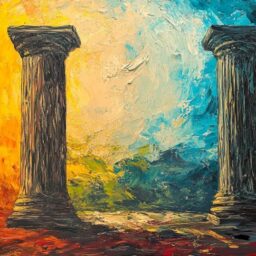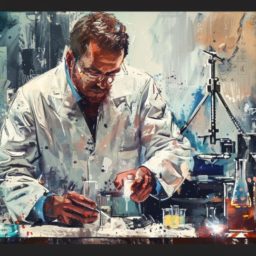
Scientific attitudes are not based on rational evaluation of evidence, and therefore providing information does not change them. Attitudes are determined instead by a host of contextual and cultural factors that make them largely immune to change. | Steven Sloman Continue reading Scientific Attitudes Are Not Based on Rational Evaluation of Evidence Steven Sloman

Close Pop-up All Episodes This is the source material used to create this podcast. Posts where this video is embedded Conclusion: Two Pillars of Truth Critical thinking – a civic dutyTags: NotebookLM (6) | podcast (20) | scientific method (27) | Socratic elenchus (8) | Socratic method (14)Google Web Search Photo Credits: Midjourney ()This page is part … Continue reading Two Pillars of Truth Podcast generated by NotebookLM

If you are setting out to work in a new field you should thoroughly research that field. Right? Wrong! The traditional view is that you should read all that you can in order to get the base of existing knowledge and then move forward from this. There is a flaw in this argument and it is a flaw in the scientific method. We do not just get … | Edward de Bono Continue reading A Flaw in the Scientific Method Edward de Bono

1. It is easy to obtain confirmations, or verifications, for nearly every theory–if we look for confirmations. 2. Confirmations should count only if they are the result of risky predictions; that is to say, if, unenlightened by the theory in question, we should have expected an event which was incompatible with the theory–an event which would have refuted the theory. 3. Every ‘good’ scientific … | Karl Popper Continue reading Science as Falsification Karl Popper

This talk by Peter Boghossian at The Ramsay Centre for Western Civilisation explores the applicability and significance of the Socratic method in fostering critical thinking and advancing civilization. Peter begins by highlighting his interest in finding simple, conceptual “bales of hay” to clean up cognitive processes, inspired by a childhood lesson from his father on … Continue reading The Socratic Method in the Western Tradition Peter Boghossian (2023)

WikipediaCarl SaganYouTubeCarl SaganGoogleCarl SaganBooks: Carl SaganCarl Sagan American astronomer, planetary scientist, cosmologist, astrophysicist, astrobiologist, author, and science communicator.Carl Sagan – Prophetic Last Interview Carl Sagan (1995)Carl Sagan’s Dragon Carl SaganI Have a Foreboding Carl SaganScience Is a Profound Source of Spirituality Carl SaganThe Power of Skepticism Carl SaganThe Rise of Technical Civilizations Carl SaganQuotations: Carl … Continue reading Carl Sagan American astronomer, planetary scientist, cosmologist, astrophysicist, astrobiologist, author, and science communicator.

Conclusion: Two Pillars of Truth The Scientific Method Close Pop-up all posts in this chapter What’s the Vibe? Please be patient as this may take up to a minute to load… Close In this chapter, I explore the two foundational pillars of truth-seeking: the scientific method and the Socratic elenchus. The pursuit of truth is … Continue reading Introduction: Two Pillars of Truth The convergence of science and philosophy in the pursuit of knowledge

Introduction: Two Pillars of Truth The Provisional Nature of Scientific Knowledge Close Pop-up all posts in this chapter What’s the Vibe? Please be patient as this may take up to a minute to load… Close Understanding the scientific method is crucial for navigating the complexities of the natural world. Many people struggle with science because … Continue reading The Scientific Method The backbone of modern science

The Scientific Method Understanding Scientific Terms Close Pop-up all posts in this chapter What’s the Vibe? Please be patient as this may take up to a minute to load… Close Scientific knowledge is always open to change and revision. This provisional nature of knowledge can be misunderstood as a flaw in the scientific method, leading … Continue reading The Provisional Nature of Scientific Knowledge Understanding science as an ongoing process

The Provisional Nature of Scientific Knowledge Congruence, Coherence, and Contingent Truth Close Pop-up all posts in this chapter What’s the Vibe? Please be patient as this may take up to a minute to load… Close Scientific terms have precise meanings but are often misunderstood outside scientific circles. This confusion frequently leads to misinterpretations of scientific … Continue reading Understanding Scientific Terms Clarifying common misconceptions

Congruence, Coherence, and Contingent Truth The Roots of the Scientific Method Close Pop-up all posts in this chapter What’s the Vibe? Please be patient as this may take up to a minute to load… Close Science aims to uncover the truths of the natural world through careful observation and experimentation. However, it’s essential to acknowledge … Continue reading The Fallibility of Science Understanding the limits and strengths of science

The Fallibility of Science The Scientific Method for Everyday Life Close Pop-up all posts in this chapter What’s the Vibe? Please be patient as this may take up to a minute to load… Close The scientific method has evolved to solve problems through rigorous inquiry. Facing global issues requires clear, evidence-based approaches. Historical insights into … Continue reading The Roots of the Scientific Method Exploring the history of the scientific method

Conversational Leadership naturally integrates with the principles of the scientific method. Both emphasize inquiry and dialogue. While the scientific method is often linked to laboratory experiments, its structured approach of observation, hypothesis, and analysis can enrich our everyday conversations and decision-making. Continue reading The Scientific Method for Everyday Life Thinking and decision-making beyond the lab

The Scientific Method for Everyday Life Recognising New Age Mumbo Jumbo Close Pop-up all posts in this chapter What’s the Vibe? Please be patient as this may take up to a minute to load… Close Misinformation and disinformation are common on the web, often overshadowing crucial facts. Pseudoscience, in particular, masquerades as legitimate science without … Continue reading Pseudoscience and Its Dangers Misinformation and its impact on society

Pseudoscience and Its Dangers The Socratic Method Close Pop-up all posts in this chapter What’s the Vibe? Please be patient as this may take up to a minute to load… Close Much like pseudoscience, New Age beliefs and practices are widespread and often presented in confusing or meaningless terms, which can mislead people into adopting … Continue reading Recognising New Age Mumbo Jumbo Understanding and avoiding deceptive New Age ideas

How Could We Be Wrong? Conclusion: Two Pillars of Truth Close Pop-up all posts in this chapter What’s the Vibe? Please be patient as this may take up to a minute to load… Close The pursuit of truth is a fundamental human endeavor. However, arriving at the truth can be challenging, as our beliefs and … Continue reading The Two Pillars of Truth How the scientific method and Socratic elenchus underpin civilization

The Two Pillars of Truth Introduction: Two Pillars of Truth Close Pop-up all posts in this chapter What’s the Vibe? Please be patient as this may take up to a minute to load… Close We need to recognize that the pursuit of truth and the application of rigorous critical thinking are not just intellectual exercises … Continue reading Conclusion: Two Pillars of Truth Critical thinking – a civic duty

There are several ways of attempting to “know something” (acquiring knowledge). Some of them are more reliable than others. Continue reading Ways of Knowing Ways of acquiring knowledge

The Argumentative Theory of Human Reason Knowledge Is Communal Close Pop-up all posts in this chapter What’s the Vibe? Please be patient as this may take up to a minute to load… Close As individuals, we know almost nothing compared to what we think we know. Our individual knowledge is mostly a delusion. We are … Continue reading The Knowledge Delusion We know far less than we think we do

The Knowledge Delusion The Extended Mind Close Pop-up all posts in this chapter What’s the Vibe? Please be patient as this may take up to a minute to load… Close We think we know more than we do, but most of our knowledge exists in the minds of others. This shared understanding allows us to … Continue reading Knowledge Is Communal Most of our knowledge resides in other people

Rethinking Our Beliefs The Allure of Simple Stories Close Pop-up all posts in this chapter What’s the Vibe? Please be patient as this may take up to a minute to load… Close What we consider to be our personal knowledge is mostly a delusion. Most of the knowledge we think we own resides in other … Continue reading Trust & Belief Formation Trust plays a critical role in forming our beliefs

How Beliefs Shape Reasoning Discrediting People ** Close Pop-up all posts in this chapter What’s the Vibe? Please be patient as this may take up to a minute to load… Close Motivated reasoning is where we look for arguments in favor of conclusions we want to believe, regardless of the evidence. This is a primary … Continue reading Science Curiosity A desire to seek out and consume scientific information for pleasure















